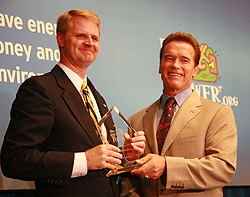Berkeleyan
Awards
![]()
24 August 2006
Flex Your Power
UC Berkeley was one of three recipients of the Flex Your Power Award, California's top energy-efficiency award, presented recently at a ceremony in Los Angeles.
 Vice Chancellor Nathan Brostrom (left) received the campus's Flex Your Power Award from Gov. Arnold Schwarzenegger. |
Vice Chancellor - Administration Nathan Brostrom accepted the award from Gov. Arnold Schwarzenegger on behalf of the campus. Adobe Systems and the California Public Employees' Retirement System (CALPERS) were also recognized by Flex Your Power, a partnership of California utilities, residents, businesses, institutions, government agencies, and nonprofit organizations working to save energy.
The campus was recognized for engaging faculty, staff, and students in its highly successful conservation efforts, which included creating the Green Building Research Center and holding contests like "Blackout Battles," in which residence halls competed to lower their energy use. Thanks to a number of actions taken, more than 10 million kilowatt hours and about $1 million a year in power costs are saved annually on the Berkeley campus.
Lawrence Berkeley National Laboratory
Four of R&D Magazine's prestigious R&D 100 Awards for 2006, the editors' choices for the 100 most significant proven technological advances of the year, have gone to researchers at the Lawrence Berkeley National Laboratory and their colleagues.
The 2006 award designees are the Carbon Explorer (created by members of the Earth Sciences Division, working with colleagues at the Scripps Institution of Oceanography and WET Labs of Portland, Ore.) - a free-drifting instrument that submerges to measure particulate carbon in the upper layers of the ocean and returns to the surface to report by satellite from the most remote regions of the globe; a High-Efficiency Multiband Semiconductor Material for Solar Cells, discovered and developed in the Materials Sciences Division - a semiconductor alloy of zinc, manganese, and tellurium treated to have multiple band gaps, so that a single junction of the material may be able to convert virtually the full spectrum of sunlight to electrical current; the Laser Ultrasonic Sensor, developed by members of the Environmental Energy Technologies Division and colleagues at the Institute of Paper Science and Technology at the Georgia Institute of Technology - a sensor and control system to ensure optimum paper quality and efficient use of trees, chemicals, and energy by measuring stiffness and shear strength as paper speeds through the production web; and the High-Output Coaxial-Target Neutron Generator, invented and engineered by members of the Accelerator and Fusion Research Division and the Engineering Division - a compact cylindrical neutron generator capable of emitting quadrillions of neutrons per second, enough to compete with large accelerator facilities.
Cheryl Fragiadakis, who heads LBNL's Technology Transfer and Intellectual Property Management Department, says, "Winning four awards, given the size of our lab, is a tremendous achievement. It speaks highly of the strength of our science and its relevance to solving complex global problems." Fragiadakis points out that this year's four R&D 100 awards are the most for a single year since 1987, bringing the lab's total for these "Oscars of Invention" to 41. "I am particularly pleased to note that, for the most part, this year's winners are already being further developed by partners in the private sector."
2006 CASE WealthEngine Award for Educational Fundraising
Berkeley has received national recognition for its fundraising program from the Council for the Advancement and Support of Education (CASE). The campus has been honored for raising record-breaking amounts in private philanthropic support over the past three years - $656.4 million - helping to preserve Berkeley's excellence in education, research, and public service.
Vice Chancellor for University Relations Don McQuade will also receive a congratulatory letter along with the award certificate in August. Berkeley is one of 39 winners of the 2006 WealthEngine Awards in the U.S. Three of our peer institutions were also award recipients: UCSF, the University of Michigan, and Stanford University.
Kristin Scott
Kristin Scott, an assistant professor of neurobiology and a member of the Helen Wills Neuroscience Institute, has been selected as a 2006 John Merck Scholar. Scott is researching taste perception in the fruit fly to examine how the brain processes sensory information. John Merck Scholars are chosen from the ranks of the most promising assistant professors currently working, or planning to work, in neurobiological and cognitive sciences relating to the biology of mental disability and developmental disabilities, including developmental studies of cognition, perception, language, reading, learning, and motor performance.
John Quigley
John Quigley, the I. Donald Terner Distinguished Professor (Economics, Public Policy, Business), was elected a Foreign Member of the Royal Swedish Academy of Engineering Sciences earlier this year. Quigley chaired the economics department between 1992 and 1995 and the Berkeley Division of the Academic Senate in 1996-1997. The academy advises the Swedish government, industry, and the academic community on matters related to engineering, science, and economics, especially as they relate to technology and society. Quigley will be inducted into the academy by King Carl XVI Gustaf at an October ceremony in Stockholm.

